- Home
- Ann M. Martin
Mary Anne and the Music Page 2
Mary Anne and the Music Read online
Page 2
Abby Stevenson takes care of herself, too. Like Stacey, she has a lifelong health problem. In her case, it’s asthma plus allergies. But Abby doesn’t let her asthma slow her down. She’s a whirlwind of activity, always laughing and joking and running circles around everyone else.
Abby moved to Stoneybrook recently, along with her twin sister, Anna, and their mom. Anna and Abby are identical twins, so naturally they look a lot alike, with their thick, dark, curly hair and glasses (sometimes they wear contacts). But nobody has trouble telling them apart. They wear their hair differently, for one thing. Anna’s is short and Abby’s is long. And their personalities are different. Anna is more serious, especially about her music. She’s a talented violinist and practices all the time. We asked both twins to join the BSC when they moved here, but only Abby felt she had the time.
Anna and Abby’s dad died when they were nine. Abby doesn’t talk about him much. I have a feeling it would make her too sad. And Abby doesn’t spend much time being sad. She’s full of fun and games. In fact, I think she’d make a perfect athletic director for our cruise ship. Abby loves sports and is a natural athlete — or at least, that’s what Kristy, who would know, tells me.
Abby is our club’s alternate officer, a job that used to belong to Dawn before she moved away. If any officer can’t make it to a meeting, Abby takes over her duties.
The BSC also has two junior officers who are younger than the rest of us. Everyone I’ve mentioned so far is thirteen, but Mal and Jessi are eleven. They aren’t allowed to baby-sit at night unless it’s for their own families, but they take plenty of afternoon jobs.
Mallory Pike would be the perfect story-hour person for our ship’s day care center. First of all, she’s great with kids. She’s the oldest of eight siblings. Vanessa, Nicky, Jordan, Byron, Adam, Margo, and Claire are the other seven. Try saying their names in under two seconds the way Mal can. So Mal has plenty of experience. Second, she’s the best storyteller of all of us. She’d like to write and illustrate children’s books someday. Mal is white, with reddish-brown hair and wears glasses and braces, both of which she hates.
Jessi Ramsey, Mal’s best friend, is African-American, with black hair and dark, dark eyes. She’d make an excellent aerobics teacher for our ship’s workout center. Jessi is in great physical shape because she studies ballet. She has a younger sister named Becca and a baby brother known as Squirt. Her parents both work, so her aunt Cecelia moved in with the family to help out.
Now you’ve met everyone in the BSC. Oops, that’s not exactly true. I almost forgot about our associate members, who don’t come to meetings but who are on call for those times when we’re overwhelmed with work. One of them is Shannon Kilbourne, who lives in Kristy and Abby’s neighborhood and goes to private school. The other is Logan. He’s an excellent baby-sitter because he’s so patient and kind.
Anyway, back to our meeting the day after Granny and Pop-Pop headed out to sea. Remember how I was wondering about what could possibly ruin their trip? Well, try this: a house full of water.
That’s right. Something went very, very wrong with their plumbing and their house was flooded, not even twenty-four hours after they left! Sharon heard about it from a neighbor who was keeping an eye on the house. She called during our BSC meeting to ask a favor.
“I know it’s not your usual type of job,” Sharon told Kristy when she called. “I’ve already been in touch with my parents over a shipboard phone and told them I’d take some time off from work and handle everything. I don’t want them to cut their trip short. But I’ll need help. Would the BSC be willing to be part of my cleanup crew? I’ll pay your usual fees.”
Of course, we agreed. I pulled out the record book and drew up a schedule, making sure that at least one club member would be on hand every day for as long as the job took. I planned things so that I’d be there most of the time, especially for the next few days when everybody else was already booked up with jobs. We’d see to it that Granny and Pop-Pop’s house was back to normal by the time they returned. From ship’s crew to janitorial staff was quite a change, but my fantasy would have to be put on hold for a while longer. The BSC had work to do.
“Oh, Sharon,” I said. I couldn’t seem to say anything else. But Sharon understood.
“I know,” she answered. “I know. It’s awful, isn’t it?”
It was Saturday morning, and we were sitting on the bottom step of Granny and Pop-Pop’s basement stairs. It was the first time I’d been over there since the flood, and I couldn’t believe my eyes. The damage was far, far worse than anything I’d imagined.
Granny and Pop-Pop use their basement quite a bit. It includes a rec room, the downstairs bathroom, and the spare bedroom that Pop-Pop uses as an office ever since he retired.
Sharon had called our plumber as soon as she’d learned of the flood. He and his crew had turned off the main valve, pumped out most of the water (it had been over a foot deep in some parts of the basement!), and vacuumed out some more, but that was all they’d had time to do. They’d be coming back on Monday to figure out what had gone wrong, assess the damage to the plumbing, and start work on fixing it. Until then, we were on our own.
“I don’t even know where to start,” said Sharon, shaking her head as she looked around. She sounded as if she were in shock.
Me? I was still speechless. I knew how Granny and Pop-Pop felt about their little house. “It’s our nest,” Granny would say lovingly, whenever someone complimented her on some curtains she’d made or on the way she’d decorated. And Pop-Pop was proud of the way he kept up the place, doing whatever small tasks were needed himself instead of hiring someone the way many of their friends did. He’d worked hard on converting the rec room into a cozy space for entertaining, and he’d built some of the shelves and cabinets in his office himself, hammering and sawing his evenings away in the tiny workshop he’d set up in a corner of the basement.
From our perch on the stairs I could tell that there was still plenty of moisture in the basement. The musty smell was the first clue. Also, the carpet was about three shades darker than its usual light blue, so I knew it was saturated. Clumps of sopping-wet magazines and newspapers were strewn around the floor. I saw a wicker wastebasket that I knew belonged in the bathroom. It must have floated out when the water was high.
I sighed. We had our work cut out for us.
Sharon stood up. “Well, let’s take a look around and see if we can figure out what to do first,” she said.
We stepped onto the carpet, and I felt it squish beneath my sneakers. “This carpet is going to have to come out,” I said. “Do you think it can be dried and saved?”
Sharon shrugged. “I think that’s a question we’re going to be asking a lot today,” she said. “And I have a feeling that in many cases the answer is going to be no. Water damage is hard to overcome.”
We squished down the hall and into the rec room.
“Oh, boy,” muttered Sharon.
“Ugh,” I said. “What a mess.”
The tan plaid couch was soaked at least halfway up, and so was the matching recliner. The legs of the coffee table showed where the high-water mark had been. The beautiful hooked rug Granny had worked on all last winter — a floral pattern featuring roses and ivy — was ruined beyond repair.
“The TV and the stereo look okay,” said Sharon. “Good thing they’re up high.”
When she said “stereo,” I had an awful thought. “What about the records?” I asked. Granny and Pop-Pop have a huge collection of old records, mostly from when they were younger. They love to come down to the rec room after dinner, put on a stack of their big-band albums, and dance a few turns around the room. I’ve seen them do it more than once, and I’ve always thought it was so romantic.
“Doesn’t look good,” commented Sharon, pointing to the floor-level shelving beneath the stereo cabinet. All the records were stored there, which meant they’d all been underwater. “But maybe they can be salvaged,” she went on. “We’
ll come back to them.” I knew she wanted to keep going until we had a complete understanding of the damage.
We looked around some more.
“It’s lucky those photo albums happened to be up there,” I said, indicating a higher shelf. A large shelving unit filled one wall of the rec room, and everything on the upper shelves was dry.
“Oh, Granny would have been devastated to lose those,” said Sharon with relief. “Let’s take them upstairs today to make sure they don’t absorb any more moisture than they already have. It’s so damp down here.”
I realized I was going to be doing a lot of carrying over the next few days. Practically everything that could be moved would have to be taken out of the basement so it would have a chance to dry. Fortunately, we’d been having a spell of sunny days. With luck, the weather would hold and we’d be able to dry things quickly by bringing them outside.
“These games are a total loss,” said Sharon, pointing to a stack of board games piled on a lower shelf. Their cardboard boxes were soaked and peeling. “Somehow I don’t think Granny will mind very much. I kind of doubt she and Pop-Pop have been playing Clue too often lately.” She grinned at me, and I giggled. We would need to keep our sense of humor as we worked.
“Can you imagine Pop-Pop insisting to Granny that it was Colonel Mustard, in the library, with a candlestick?” I asked. I knew Granny and Pop-Pop had kept the games around for kids who visited, but it was funny to picture the two of them rolling dice and moving pieces around a board.
Once we’d checked out the rec room, we moved on to the bathroom. Since it’s all tiled, there wasn’t much damage, except for the wastebasket floating off. You could see the marks where the water had been, and everything would need a good cleaning, but nothing was ruined.
The spare bedroom was another story. It was a disaster. I nearly cried when I saw the beautiful quilt Granny had made, soaked from the bottom up. (The quilt was long enough to reach the floor.) The colors were running and the quilt lay limply on the bed. “What a shame,” I said. But Sharon wasn’t listening or paying any attention to the quilt.
Her gaze had gone to the tall, four-drawer file cabinet next to Pop-Pop’s desk on the other side of the room. She practically ran to it and yanked open one of the bottom drawers. She pulled out a dripping-wet bundle of papers and tossed it aside. “Old tax records,” she said over her shoulder. “Pop-Pop saved them longer than he needed to.” She opened the next drawer and peered inside. “Files from his last job,” she said. “They’re pretty damp but they look okay. He can go through them and salvage anything important.”
Then she pulled open the drawer above that one, looked inside, and let out a huge sigh of relief. “Dry,” she said. “Thank goodness.”
“What’s in there?” I asked, curious.
“History,” said Sharon quietly. “Granny and Pop-Pop’s letters and papers. From the time they were kids and writing childish notes to friends and relations, all the way through until today. They probably fill up this top drawer, too.” She pulled the drawer open, looked inside, and nodded.
“Wow,” I said. “I never knew they were here.”
“I did,” said Sharon. “And I’ve always meant to help Granny and Pop-Pop sort and preserve them. I’ve been kicking myself ever since I heard about the flood. I was afraid they’d been lost forever.”
“It’s a good thing they weren’t in the bottom drawers,” I said.
“A very good thing,” agreed Sharon. “And this time I’m going to make sure they’re safe.” She shut the drawers. “We’ll take them upstairs today. That’ll be a start, anyway.” Then she turned to look around at the rest of the room. “So what else is ruined in here?” she asked.
We took a quick inventory. The bottom drawer of the dresser had been underwater, but it hadn’t held anything more than mothballs. Another hooked rug, this one with a moon-and-stars design, had been soaked and possibly ruined. And Pop-Pop’s entire collection of old National Geographic magazines, which had taken up the whole bottom shelf of a long bookcase, had turned into a soggy, pulpy mess.
“Well,” said Sharon, “I guess it’s time to start working.” She gave me a smile. “I’m glad we wore old clothes. It’s going to be a messy job.”
“Where should we begin?” I asked.
Sharon considered for a moment. “I think we’ll need help with heavy jobs like taking up the carpet and moving big pieces of furniture,” she said. “For now, let’s concentrate on taking the lighter items upstairs. We can begin with everything that’s damp but not ruined. The stuff that’s soaked can wait, and so can the dry things, except for those letters. I’ll take them up on my first trip.”
We decided to stow everything on the little screened-in sunporch, where it could stay if the weather turned bad. During sunny days, we could put things outside to dry.
“I’m starting in here,” said Sharon. “Why don’t you tackle the stuff on the shelves in the rec room?” She reached into a pocket of the apron she was wearing and pulled out two pairs of yellow rubber gloves. “These might be a good idea,” she said, handing me a pair.
Those gloves were definitely a good idea. You wouldn’t believe what a mess water can make! I found out as soon as I started pulling things off the shelves. Books would come apart in my hands. Magazines were like slimy sea creatures. That musty odor was even stronger now. And the shelves themselves were showing signs of water damage. The longer I worked, the more I realized what a huge job we had in front of us. It wasn’t going to be easy to bring Granny and Pop-Pop’s house back to its normal state.
After I’d worked awhile on the shelves, I turned to the records, carrying loads of them up the stairs. Fifteen loads, to be exact. Records are heavy, and wet records are even worse. And Granny and Pop-Pop own a lot of records.
When I finally finished with the records I went back to the shelves. I’d just finished clearing one of the lower ones when I noticed something odd about the paneled wall that provided the backing for the shelving unit. In one spot, the paneling looked a little crooked. Just a little. It was nothing you’d ever notice, as long as the shelf was full. I reached back to touch it, and a piece of the paneling fell forward, revealing a space behind it. A little cubbyhole. What could be inside? I reached in and felt around. At first I thought the space was empty. Then my hand found a corner of something, and I reached in deeper with both hands and pulled out a box.
A tightly wrapped, slightly soggy box about the size and shape of a toaster. I turned it over in my hands. Then I gasped. Written across the top in bold black letters (a little runny from the dampness) was the following warning:
I didn’t.
Open the wrapper, that is.
Not right away, anyway. I mean, sometimes I wonder if things like curses should be taken seriously. I fitted the piece of paneling back in place, put the wrapped box aside, and kept on working, clearing off shelves and carrying things upstairs. I must have passed Sharon on the stairs six or seven times, but I didn’t say a word to her about what I’d found. Somehow I just wanted to keep it to myself and think about it for a while.
And think about it is just what I did. Fortunately, the work I was doing didn’t take much brain power. If it had, I would have been in trouble. All I could concentrate on was that mysterious package. What was inside it? Who had hidden it in the wall, and why? What if I were to open it? Would I really be cursed? What kind of curse would it be?
Opening it was probably worth the risk, since curses aren’t usually real anyway. Right? I mean, how many people do you know who have actually been cursed?
Plus, if I didn’t open the wrapper, whatever was inside would probably be ruined. It needed a chance to dry, just like everything else that had been in the basement. Curse or no curse, maybe it was my responsibility to open that wrapper.
All these thoughts were going through my head as I made my trips up and down the stairs, and finally I gave in. I picked up the box and set it on top of the stereo cabinet. Then, after taking a
deep breath, I began to unwrap it.
Immediately, my hair turned white, my fingernails grew three inches, and every bone in my body began to ache.
Just kidding. Actually, nothing happened. Instead, the wrappings fell away to reveal a beautiful little chest covered with fancy carvings of flowers and vines.
I put the wrappings aside and took a closer look at the chest. I traced the carvings with my finger, marveling at how intricate they were. Every petal and leaf looked real. I’d never seen carving like that.
The box had a gold clasp on one side and hinges on the other. I didn’t see any kind of lock. Obviously, I could open the chest if I wanted to. Did I want to? I wasn’t sure. I couldn’t help thinking about that curse. Maybe I’d gone far enough by opening the wrapper. Maybe I would just be asking for trouble if I opened the chest as well.
I picked up the wrapper again and examined the handwriting on it. It didn’t look familiar. As far as I knew, the writing was neither Granny’s nor Pop-Pop’s. Nor was it Sharon’s. And anyway, that curse stuff just wasn’t her style. Who had this chest belonged to, and why had that person hidden it?
“Whew! I’m ready to quit for the day. How about you?”
I jumped at the sound of Sharon’s voice. She had appeared in the doorway of the rec room. She wiped her brow and smiled at me. For a second, I was tempted to hide the little mahogany chest. It felt like a secret I wasn’t sure I wanted to share. But instead, I heard myself asking her about it.
“See what I found?” I said, holding it up. “It was sort of hidden away.” I didn’t mention the wrapper or the warning.
“It’s lovely,” said Sharon, coming closer to take a better look. “All those carvings!”

 Karen's Tea Party
Karen's Tea Party Kristy and the Snobs
Kristy and the Snobs Best Kept Secret
Best Kept Secret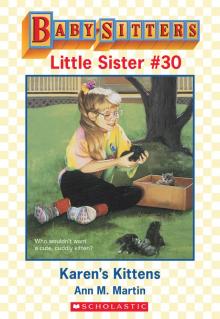 Karen's Kittens
Karen's Kittens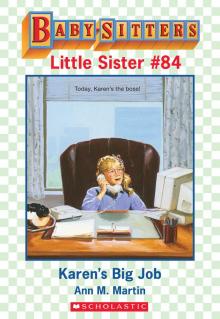 Karen's Big Job
Karen's Big Job Claudia and the Genius of Elm Street
Claudia and the Genius of Elm Street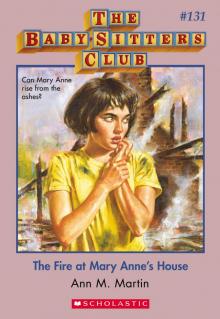 The Fire at Mary Anne's House
The Fire at Mary Anne's House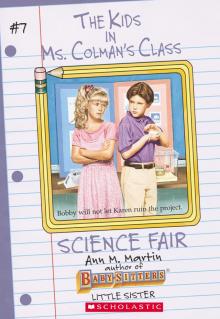 Science Fair
Science Fair Me and Katie (The Pest)
Me and Katie (The Pest) Karen's Plane Trip
Karen's Plane Trip Jessi's Wish
Jessi's Wish Dawn and Too Many Sitters
Dawn and Too Many Sitters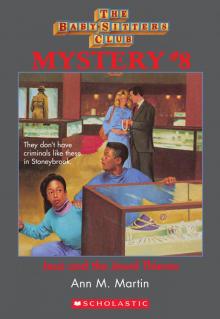 Jessi and the Jewel Thieves
Jessi and the Jewel Thieves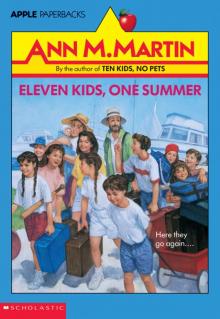 Eleven Kids, One Summer
Eleven Kids, One Summer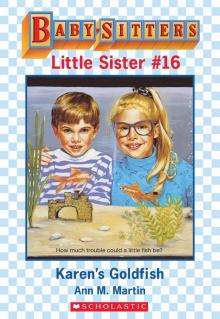 Karen's Goldfish
Karen's Goldfish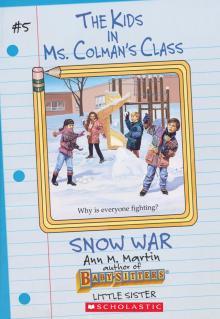 Snow War
Snow War Abby and the Secret Society
Abby and the Secret Society Keeping Secrets
Keeping Secrets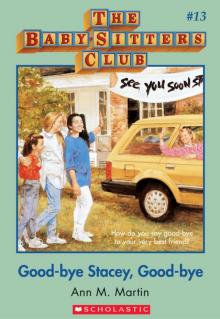 Good-Bye Stacey, Good-Bye
Good-Bye Stacey, Good-Bye Karen's Sleepover
Karen's Sleepover Claudia and the World's Cutest Baby
Claudia and the World's Cutest Baby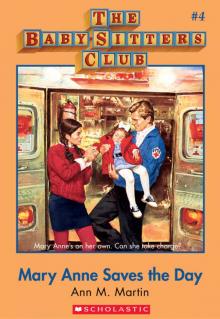 Mary Anne Saves the Day
Mary Anne Saves the Day Mallory and the Dream Horse
Mallory and the Dream Horse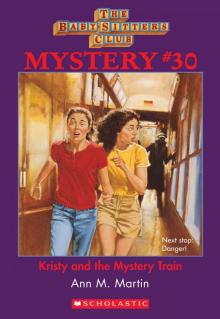 Kristy and the Mystery Train
Kristy and the Mystery Train Dawn's Family Feud
Dawn's Family Feud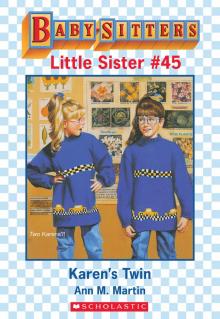 Karen's Twin
Karen's Twin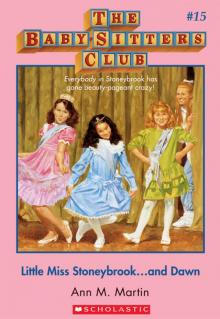 Little Miss Stoneybrook... And Dawn
Little Miss Stoneybrook... And Dawn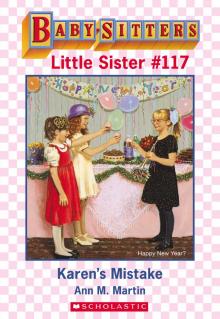 Karen's Mistake
Karen's Mistake Karen's Movie Star
Karen's Movie Star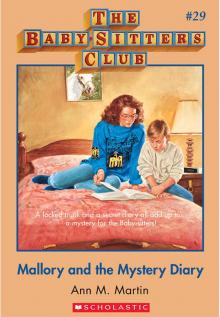 Mallory and the Mystery Diary
Mallory and the Mystery Diary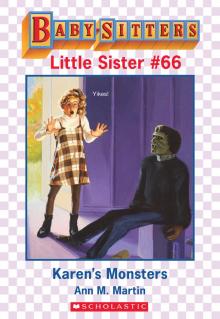 Karen's Monsters
Karen's Monsters Kristy + Bart = ?
Kristy + Bart = ?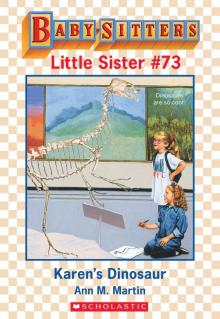 Karen's Dinosaur
Karen's Dinosaur Here Today
Here Today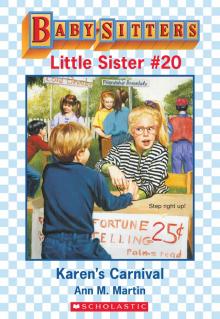 Karen's Carnival
Karen's Carnival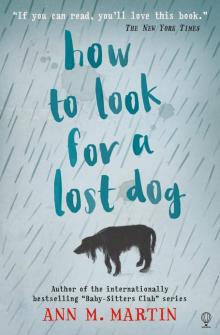 How to Look for a Lost Dog
How to Look for a Lost Dog Stacey vs. Claudia
Stacey vs. Claudia Stacey's Ex-Boyfriend
Stacey's Ex-Boyfriend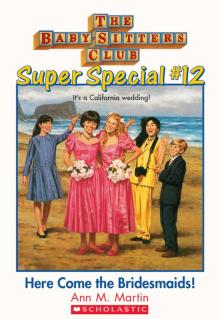 Here Come the Bridesmaids!
Here Come the Bridesmaids! Graduation Day
Graduation Day Kristy's Big News
Kristy's Big News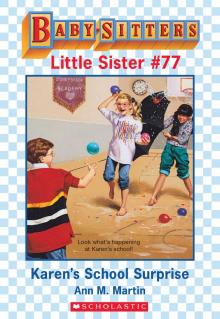 Karen's School Surprise
Karen's School Surprise Kristy Thomas, Dog Trainer
Kristy Thomas, Dog Trainer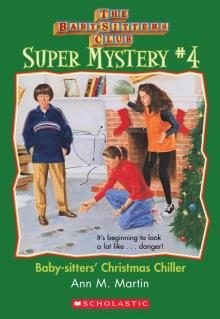 Baby-Sitters' Christmas Chiller
Baby-Sitters' Christmas Chiller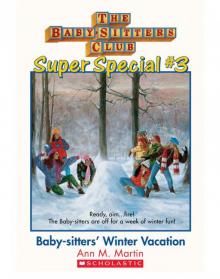 Baby-Sitters' Winter Vacation
Baby-Sitters' Winter Vacation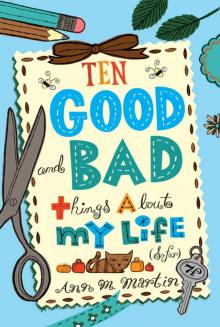 Ten Good and Bad Things About My Life
Ten Good and Bad Things About My Life Claudia and the Bad Joke
Claudia and the Bad Joke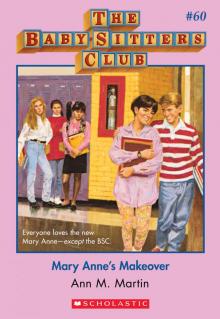 Mary Anne's Makeover
Mary Anne's Makeover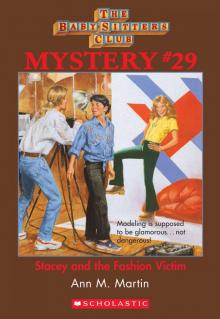 Stacey and the Fashion Victim
Stacey and the Fashion Victim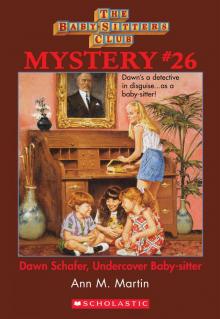 Dawn Schafer, Undercover Baby-Sitter
Dawn Schafer, Undercover Baby-Sitter Karen's Tuba
Karen's Tuba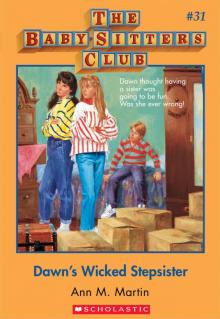 Dawn's Wicked Stepsister
Dawn's Wicked Stepsister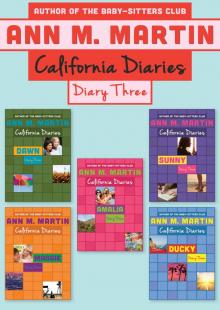 Diary Three: Dawn, Sunny, Maggie, Amalia, and Ducky
Diary Three: Dawn, Sunny, Maggie, Amalia, and Ducky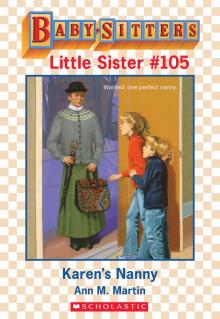 Karen's Nanny
Karen's Nanny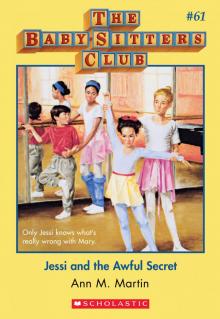 Jessi and the Awful Secret
Jessi and the Awful Secret Karen's New Year
Karen's New Year Karen's Candy
Karen's Candy Karen's President
Karen's President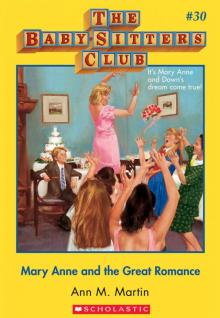 Mary Anne and the Great Romance
Mary Anne and the Great Romance Mary Anne + 2 Many Babies
Mary Anne + 2 Many Babies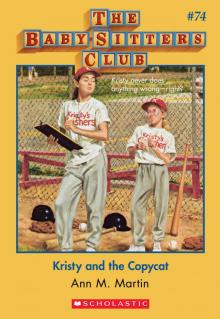 Kristy and the Copycat
Kristy and the Copycat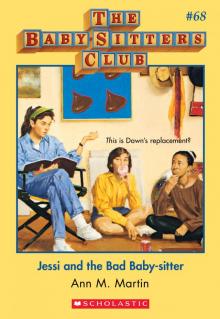 Jessi and the Bad Baby-Sitter
Jessi and the Bad Baby-Sitter Claudia, Queen of the Seventh Grade
Claudia, Queen of the Seventh Grade Claudia and the Lighthouse Ghost
Claudia and the Lighthouse Ghost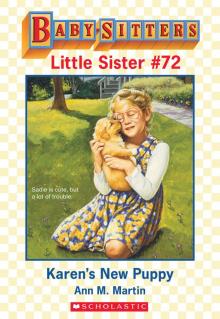 Karen's New Puppy
Karen's New Puppy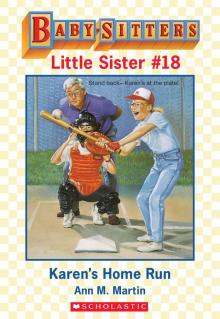 Karen's Home Run
Karen's Home Run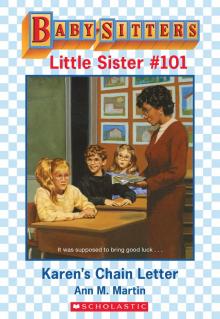 Karen's Chain Letter
Karen's Chain Letter Kristy in Charge
Kristy in Charge Karen's Angel
Karen's Angel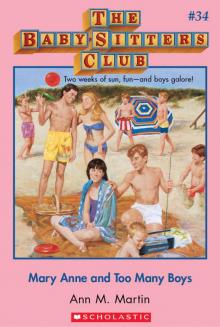 Mary Anne and Too Many Boys
Mary Anne and Too Many Boys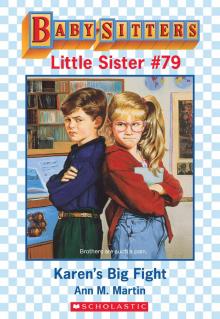 Karen's Big Fight
Karen's Big Fight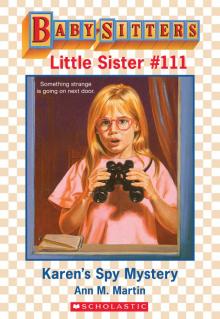 Karen's Spy Mystery
Karen's Spy Mystery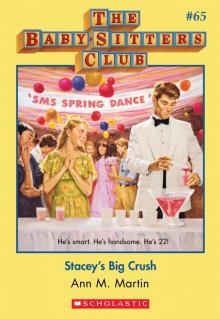 Stacey's Big Crush
Stacey's Big Crush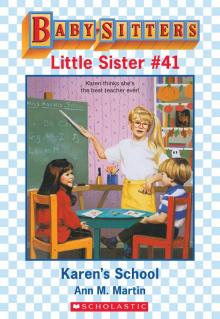 Karen's School
Karen's School Claudia and the Terrible Truth
Claudia and the Terrible Truth Karen's Cowboy
Karen's Cowboy The Summer Before
The Summer Before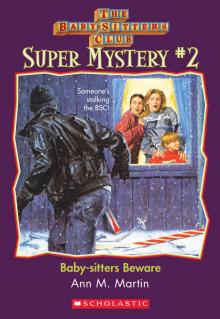 Beware, Dawn!
Beware, Dawn!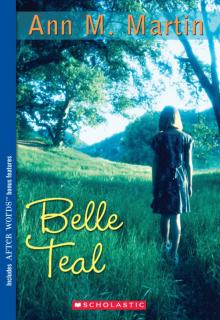 Belle Teale
Belle Teale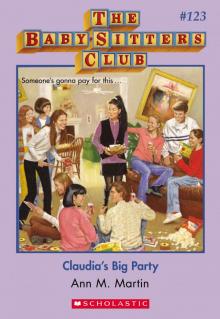 Claudia's Big Party
Claudia's Big Party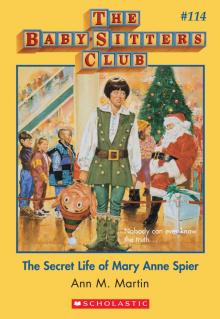 The Secret Life of Mary Anne Spier
The Secret Life of Mary Anne Spier Karen's Book
Karen's Book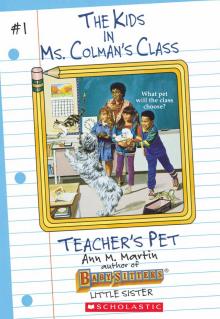 Teacher's Pet
Teacher's Pet Boy-Crazy Stacey
Boy-Crazy Stacey Claudia and the Disaster Date
Claudia and the Disaster Date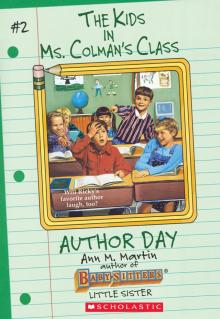 Author Day
Author Day Claudia and the Sad Good-Bye
Claudia and the Sad Good-Bye Kristy and the Worst Kid Ever
Kristy and the Worst Kid Ever Yours Turly, Shirley
Yours Turly, Shirley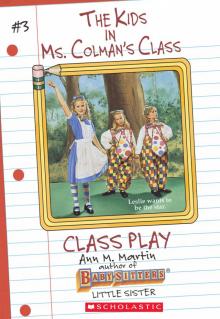 Class Play
Class Play Kristy and the Vampires
Kristy and the Vampires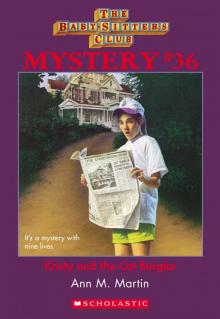 Kristy and the Cat Burglar
Kristy and the Cat Burglar Karen's Pumpkin Patch
Karen's Pumpkin Patch Stacey and the Mystery at the Empty House
Stacey and the Mystery at the Empty House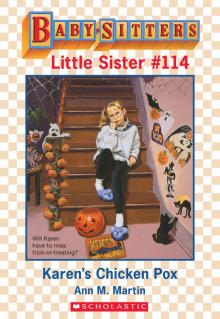 Karen's Chicken Pox
Karen's Chicken Pox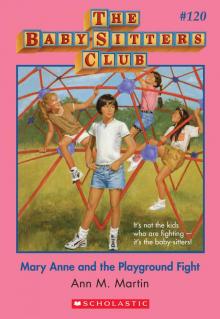 Mary Anne and the Playground Fight
Mary Anne and the Playground Fight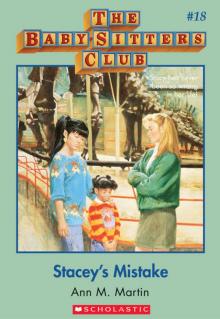 Stacey's Mistake
Stacey's Mistake Coming Apart
Coming Apart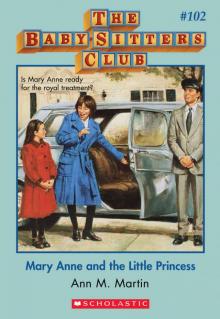 Mary Anne and the Little Princess
Mary Anne and the Little Princess Karen, Hannie and Nancy: The Three Musketeers
Karen, Hannie and Nancy: The Three Musketeers 'Tis the Season
'Tis the Season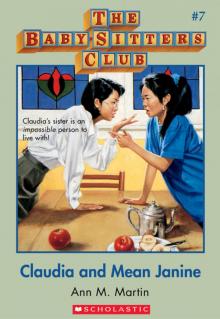 Claudia and Mean Janine
Claudia and Mean Janine Karen's School Bus
Karen's School Bus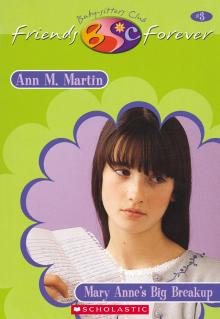 Mary Anne's Big Breakup
Mary Anne's Big Breakup Rain Reign
Rain Reign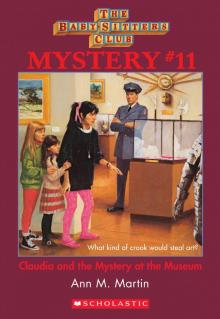 Claudia and the Mystery at the Museum
Claudia and the Mystery at the Museum Claudia and the Great Search
Claudia and the Great Search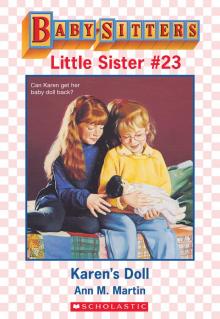 Karen's Doll
Karen's Doll Shannon's Story
Shannon's Story Sea City, Here We Come!
Sea City, Here We Come!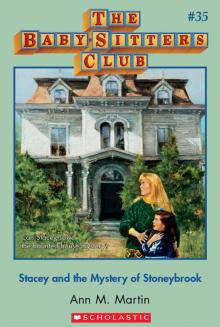 Stacey and the Mystery of Stoneybrook
Stacey and the Mystery of Stoneybrook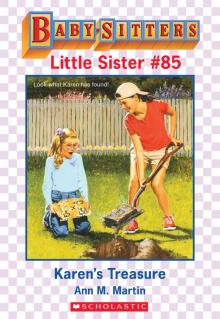 Karen's Treasure
Karen's Treasure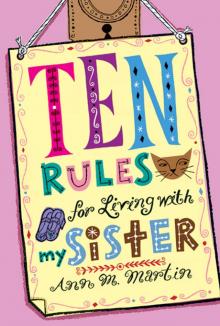 Ten Rules for Living With My Sister
Ten Rules for Living With My Sister With You and Without You
With You and Without You Baby-Sitters' Island Adventure
Baby-Sitters' Island Adventure Karen's Fishing Trip
Karen's Fishing Trip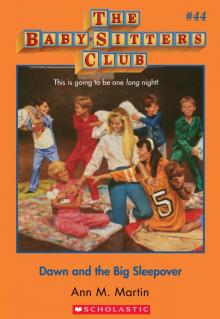 Dawn and the Big Sleepover
Dawn and the Big Sleepover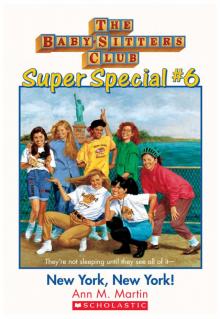 New York, New York!
New York, New York! Ten Kids, No Pets
Ten Kids, No Pets Happy Holidays, Jessi
Happy Holidays, Jessi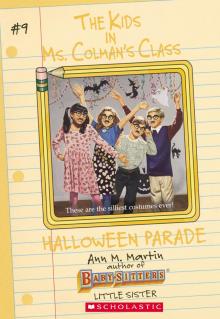 Halloween Parade
Halloween Parade Karen's New Holiday
Karen's New Holiday Kristy Power!
Kristy Power! Karen's Wish
Karen's Wish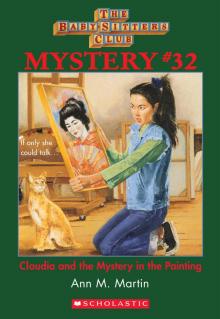 Claudia and the Mystery in the Painting
Claudia and the Mystery in the Painting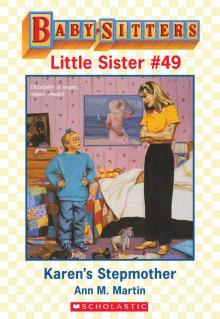 Karen's Stepmother
Karen's Stepmother Abby in Wonderland
Abby in Wonderland Karen's Snow Day
Karen's Snow Day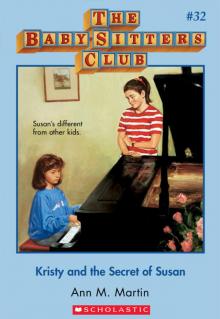 Kristy and the Secret of Susan
Kristy and the Secret of Susan Karen's Pony Camp
Karen's Pony Camp Karen's School Trip
Karen's School Trip Mary Anne to the Rescue
Mary Anne to the Rescue Karen's Unicorn
Karen's Unicorn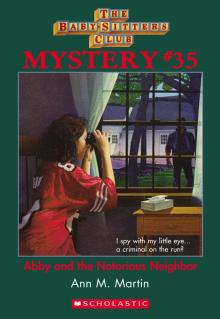 Abby and the Notorious Neighbor
Abby and the Notorious Neighbor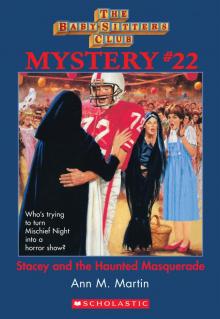 Stacey and the Haunted Masquerade
Stacey and the Haunted Masquerade Claudia Gets Her Guy
Claudia Gets Her Guy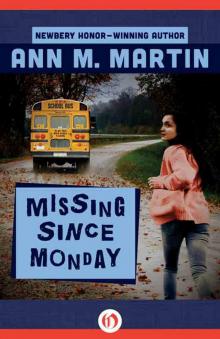 Missing Since Monday
Missing Since Monday Stacey's Choice
Stacey's Choice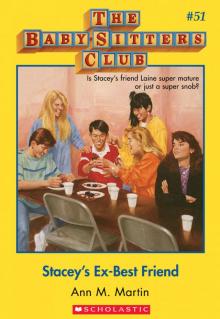 Stacey's Ex-Best Friend
Stacey's Ex-Best Friend Karen's New Teacher
Karen's New Teacher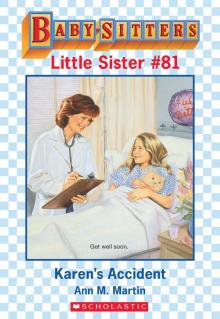 Karen's Accident
Karen's Accident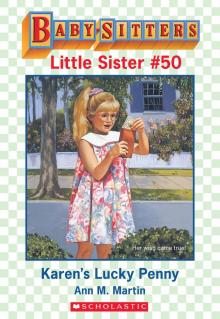 Karen's Lucky Penny
Karen's Lucky Penny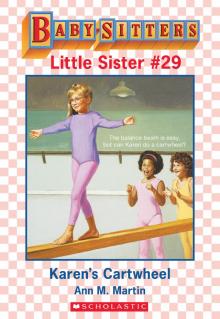 Karen's Cartwheel
Karen's Cartwheel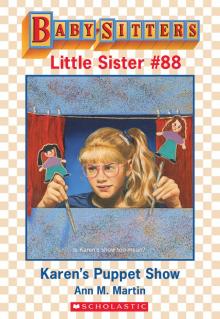 Karen's Puppet Show
Karen's Puppet Show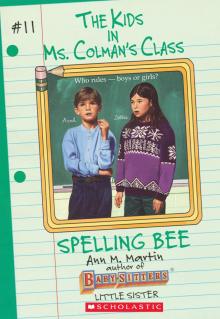 Spelling Bee
Spelling Bee Stacey's Problem
Stacey's Problem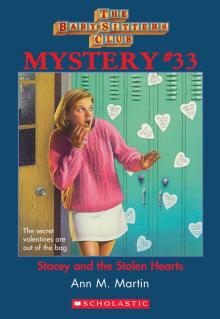 Stacey and the Stolen Hearts
Stacey and the Stolen Hearts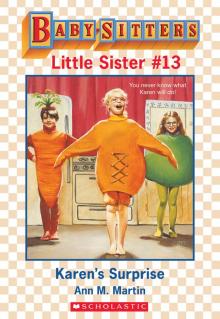 Karen's Surprise
Karen's Surprise Karen's Worst Day
Karen's Worst Day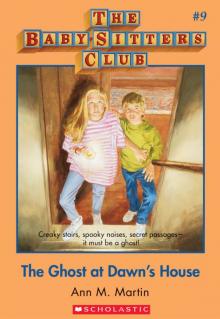 The Ghost at Dawn's House
The Ghost at Dawn's House Karen's Big Sister
Karen's Big Sister Karen's Easter Parade
Karen's Easter Parade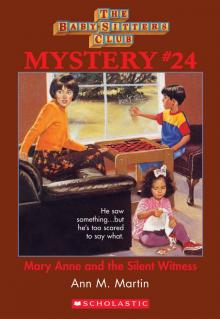 Mary Anne and the Silent Witness
Mary Anne and the Silent Witness Karen's Swim Meet
Karen's Swim Meet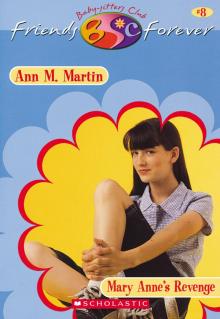 Mary Anne's Revenge
Mary Anne's Revenge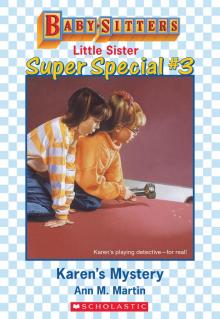 Karen's Mystery
Karen's Mystery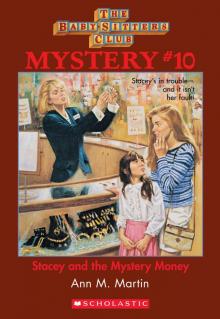 Stacey and the Mystery Money
Stacey and the Mystery Money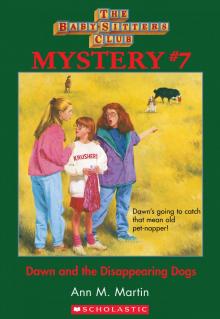 Dawn and the Disappearing Dogs
Dawn and the Disappearing Dogs Karen's Christmas Tree
Karen's Christmas Tree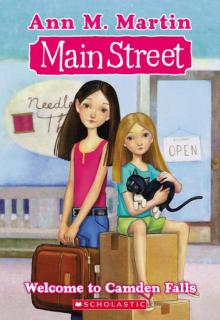 Welcome to Camden Falls
Welcome to Camden Falls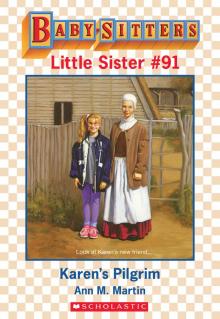 Karen's Pilgrim
Karen's Pilgrim Dawn and the Halloween Mystery
Dawn and the Halloween Mystery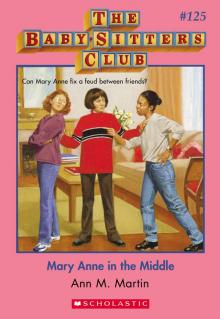 Mary Anne in the Middle
Mary Anne in the Middle Karen's Toys
Karen's Toys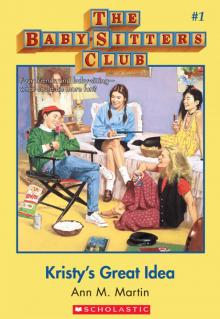 Kristy's Great Idea
Kristy's Great Idea Claudia and the Middle School Mystery
Claudia and the Middle School Mystery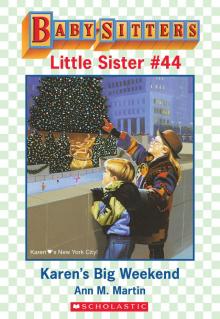 Karen's Big Weekend
Karen's Big Weekend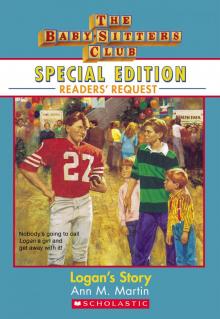 Logan's Story
Logan's Story Karen's Yo-Yo
Karen's Yo-Yo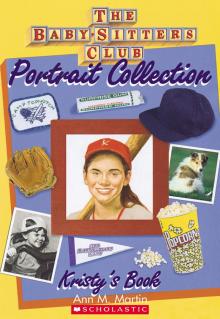 Kristy's Book
Kristy's Book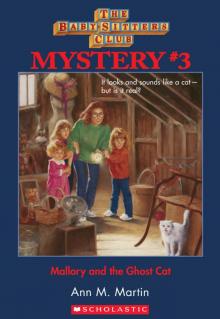 Mallory and the Ghost Cat
Mallory and the Ghost Cat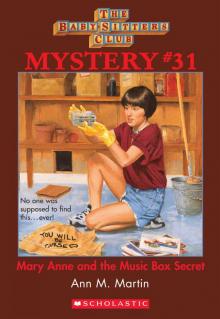 Mary Anne and the Music
Mary Anne and the Music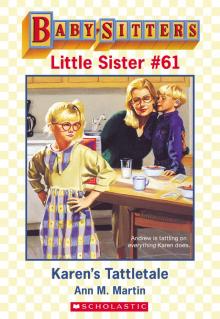 Karen's Tattletale
Karen's Tattletale Karen's County Fair
Karen's County Fair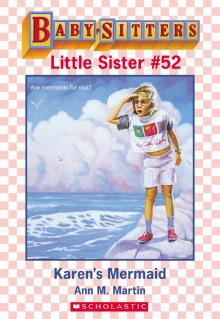 Karen's Mermaid
Karen's Mermaid Snowbound
Snowbound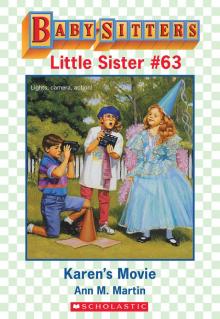 Karen's Movie
Karen's Movie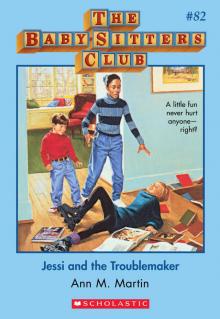 Jessi and the Troublemaker
Jessi and the Troublemaker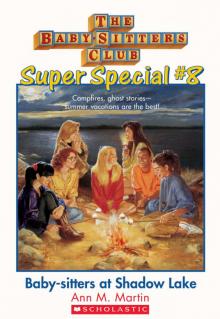 Baby-Sitters at Shadow Lake
Baby-Sitters at Shadow Lake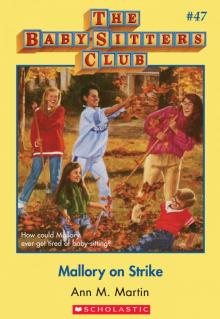 Mallory on Strike
Mallory on Strike Jessi's Baby-Sitter
Jessi's Baby-Sitter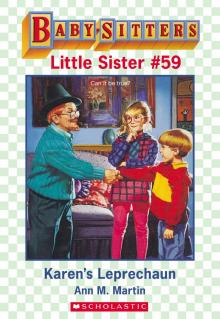 Karen's Leprechaun
Karen's Leprechaun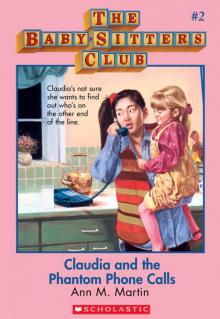 Claudia and the Phantom Phone Calls
Claudia and the Phantom Phone Calls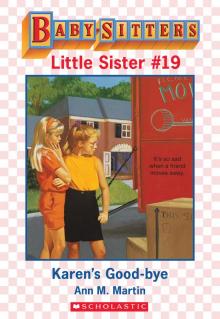 Karen's Good-Bye
Karen's Good-Bye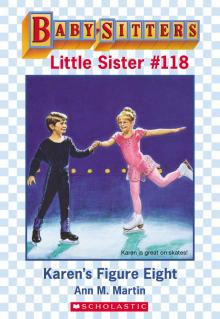 Karen's Figure Eight
Karen's Figure Eight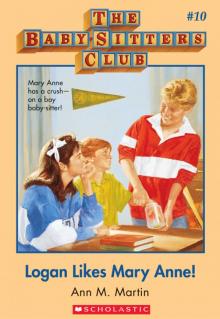 Logan Likes Mary Anne!
Logan Likes Mary Anne! Mary Anne and the Zoo Mystery
Mary Anne and the Zoo Mystery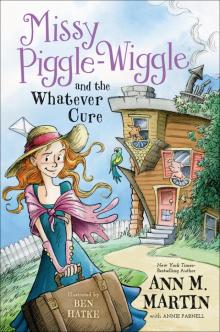 Missy Piggle-Wiggle and the Whatever Cure
Missy Piggle-Wiggle and the Whatever Cure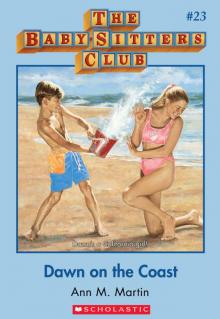 Dawn on the Coast
Dawn on the Coast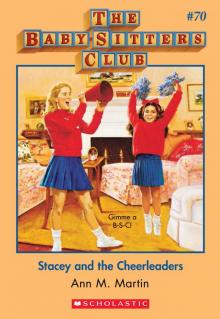 Stacey and the Cheerleaders
Stacey and the Cheerleaders Claudia and the Clue in the Photograph
Claudia and the Clue in the Photograph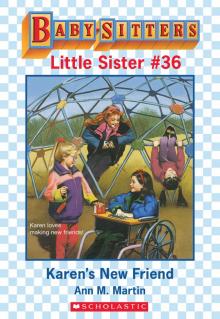 Karen's New Friend
Karen's New Friend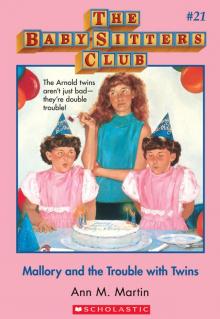 Mallory and the Trouble With Twins
Mallory and the Trouble With Twins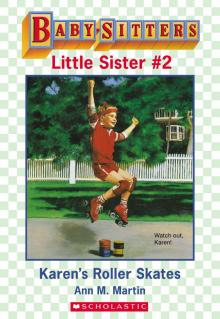 Karen's Roller Skates
Karen's Roller Skates Abby and the Best Kid Ever
Abby and the Best Kid Ever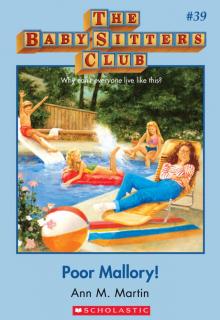 Poor Mallory!
Poor Mallory! Karen's Witch
Karen's Witch Karen's Grandmothers
Karen's Grandmothers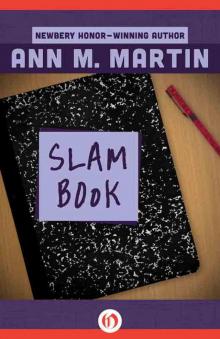 Slam Book
Slam Book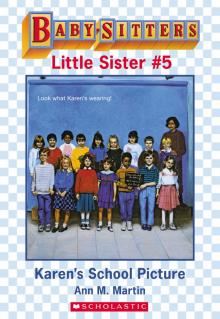 Karen's School Picture
Karen's School Picture Karen's Reindeer
Karen's Reindeer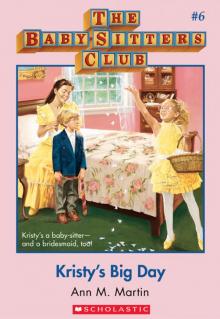 Kristy's Big Day
Kristy's Big Day The Long Way Home
The Long Way Home Karen's Sleigh Ride
Karen's Sleigh Ride On Christmas Eve
On Christmas Eve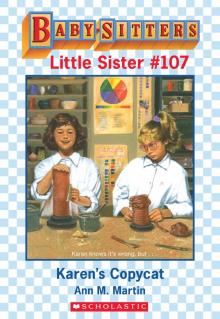 Karen's Copycat
Karen's Copycat Karen's Ice Skates
Karen's Ice Skates Claudia and the Little Liar
Claudia and the Little Liar Abby the Bad Sport
Abby the Bad Sport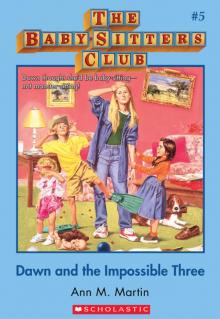 The Baby-Sitters Club #5: Dawn and the Impossible Three
The Baby-Sitters Club #5: Dawn and the Impossible Three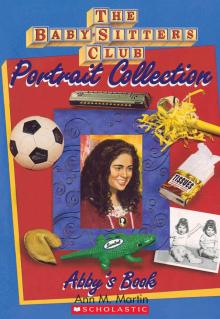 Abby's Book
Abby's Book Karen's Big Top
Karen's Big Top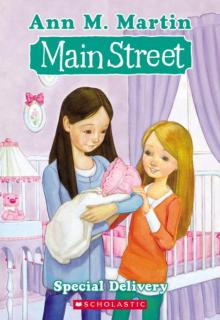 Main Street #8: Special Delivery
Main Street #8: Special Delivery Kristy and the Kidnapper
Kristy and the Kidnapper Karen's Ski Trip
Karen's Ski Trip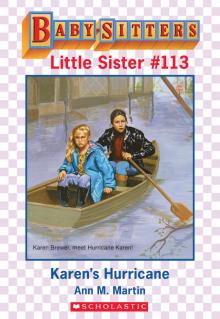 Karen's Hurricane
Karen's Hurricane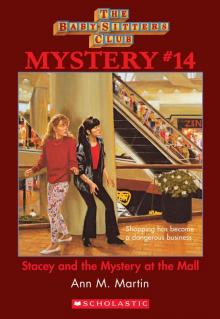 Stacey and the Mystery at the Mall
Stacey and the Mystery at the Mall Jessi and the Superbrat
Jessi and the Superbrat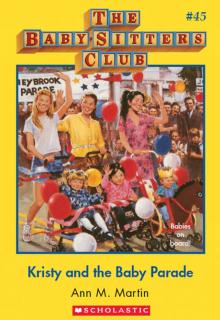 Kristy and the Baby Parade
Kristy and the Baby Parade Karen's New Bike
Karen's New Bike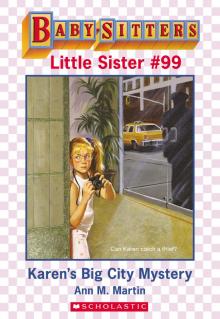 Karen's Big City Mystery
Karen's Big City Mystery Baby-Sitters' European Vacation
Baby-Sitters' European Vacation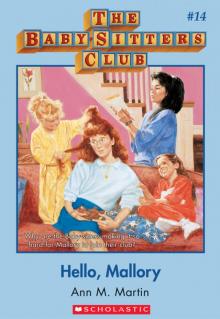 Hello, Mallory
Hello, Mallory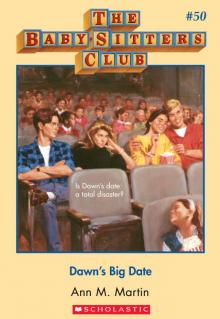 Dawn's Big Date
Dawn's Big Date Karen's Christmas Carol
Karen's Christmas Carol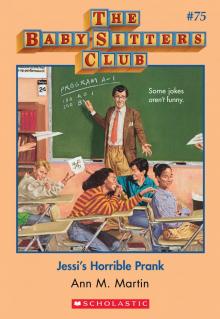 Jessi's Horrible Prank
Jessi's Horrible Prank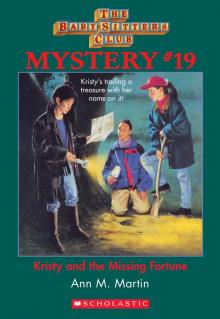 Kristy and the Missing Fortune
Kristy and the Missing Fortune Kristy and the Haunted Mansion
Kristy and the Haunted Mansion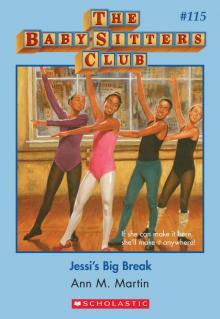 Jessi's Big Break
Jessi's Big Break Karen's Pony
Karen's Pony Welcome Home, Mary Anne
Welcome Home, Mary Anne Stacey the Math Whiz
Stacey the Math Whiz September Surprises
September Surprises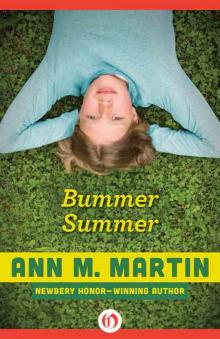 Bummer Summer
Bummer Summer Karen's Secret
Karen's Secret Abby's Twin
Abby's Twin Main Street #4: Best Friends
Main Street #4: Best Friends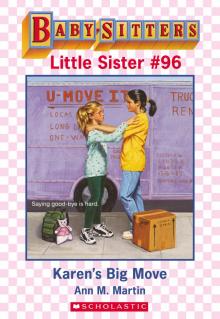 Karen's Big Move
Karen's Big Move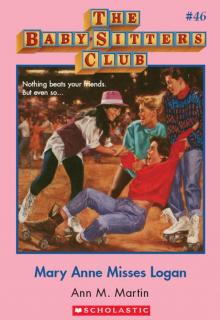 Mary Anne Misses Logan
Mary Anne Misses Logan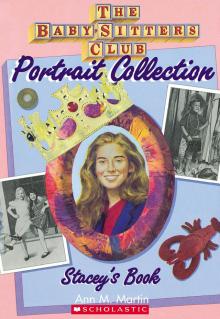 Stacey's Book
Stacey's Book Claudia and the Perfect Boy
Claudia and the Perfect Boy Holiday Time
Holiday Time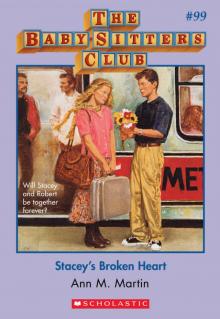 Stacey's Broken Heart
Stacey's Broken Heart Karen's Field Day
Karen's Field Day Kristy's Worst Idea
Kristy's Worst Idea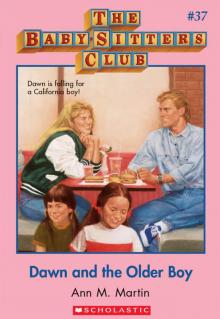 Dawn and the Older Boy
Dawn and the Older Boy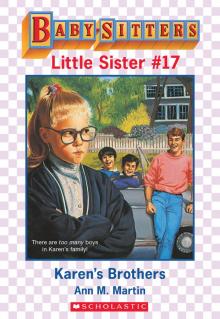 Karen's Brothers
Karen's Brothers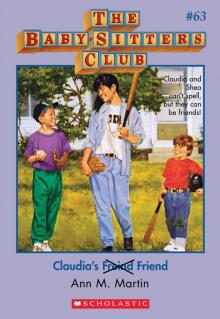 Claudia's Friend
Claudia's Friend Mary Anne and the Haunted Bookstore
Mary Anne and the Haunted Bookstore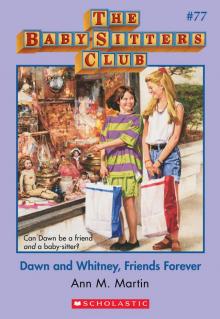 Dawn and Whitney, Friends Forever
Dawn and Whitney, Friends Forever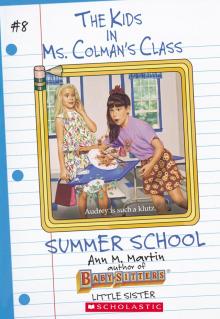 Summer School
Summer School Karen's Birthday
Karen's Birthday Karen's Black Cat
Karen's Black Cat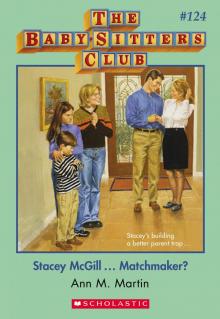 Stacey McGill... Matchmaker?
Stacey McGill... Matchmaker?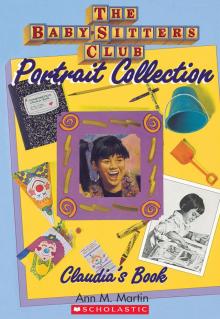 Claudia's Book
Claudia's Book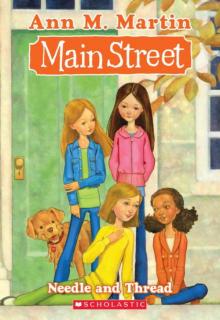 Main Street #2: Needle and Thread
Main Street #2: Needle and Thread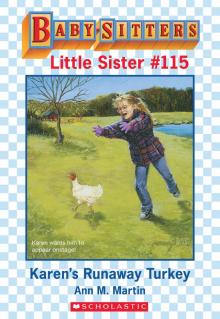 Karen's Runaway Turkey
Karen's Runaway Turkey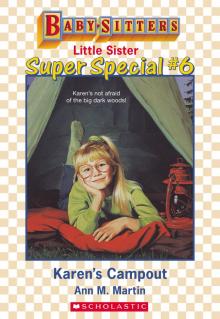 Karen's Campout
Karen's Campout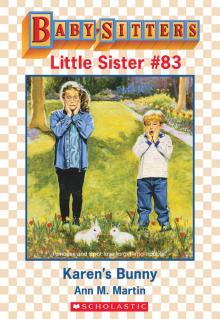 Karen's Bunny
Karen's Bunny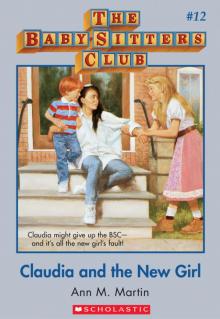 Claudia and the New Girl
Claudia and the New Girl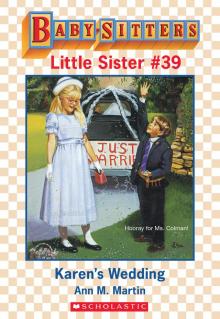 Karen's Wedding
Karen's Wedding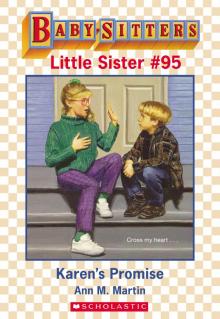 Karen's Promise
Karen's Promise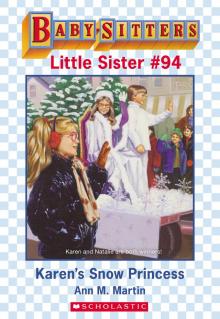 Karen's Snow Princess
Karen's Snow Princess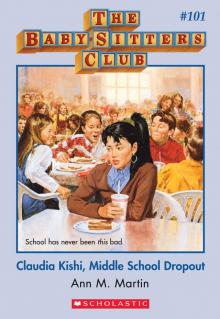 Claudia Kishi, Middle School Dropout
Claudia Kishi, Middle School Dropout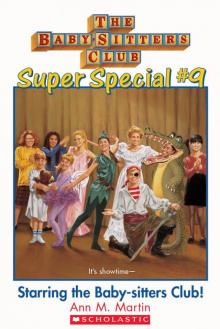 Starring the Baby-Sitters Club!
Starring the Baby-Sitters Club! Kristy for President
Kristy for President California Girls!
California Girls!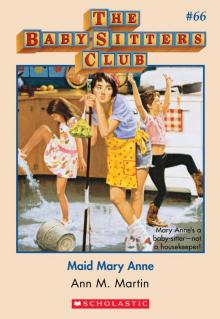 Maid Mary Anne
Maid Mary Anne Abby's Un-Valentine
Abby's Un-Valentine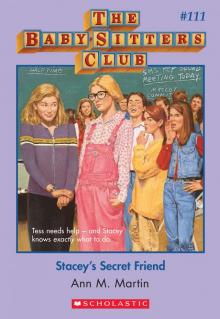 Stacey's Secret Friend
Stacey's Secret Friend Karen's Haunted House
Karen's Haunted House Claudia and Crazy Peaches
Claudia and Crazy Peaches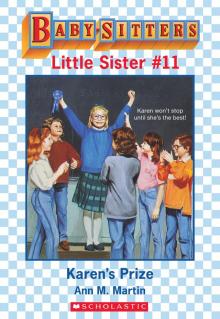 Karen's Prize
Karen's Prize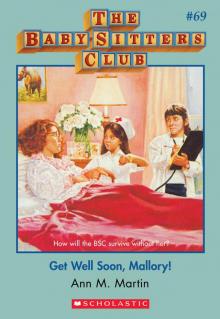 Get Well Soon, Mallory!
Get Well Soon, Mallory!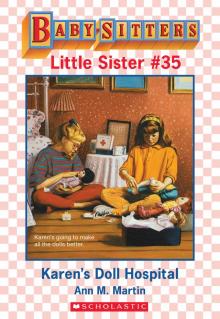 Karen's Doll Hospital
Karen's Doll Hospital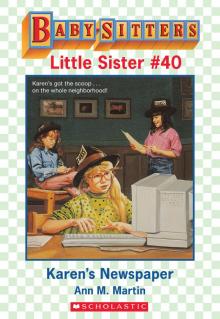 Karen's Newspaper
Karen's Newspaper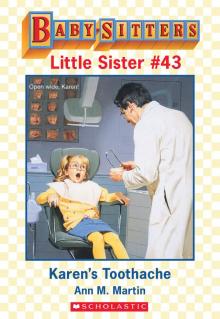 Karen's Toothache
Karen's Toothache Mary Anne and Miss Priss
Mary Anne and Miss Priss Abby's Lucky Thirteen
Abby's Lucky Thirteen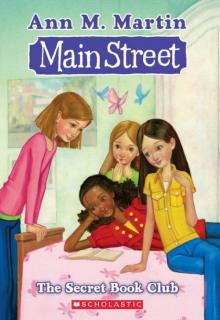 The Secret Book Club
The Secret Book Club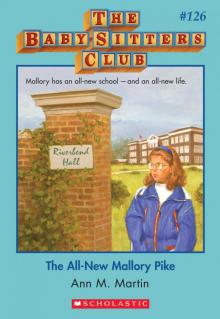 The All-New Mallory Pike
The All-New Mallory Pike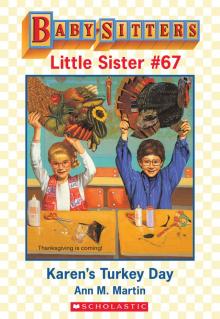 Karen's Turkey Day
Karen's Turkey Day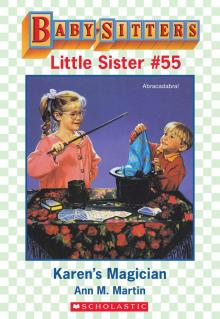 Karen's Magician
Karen's Magician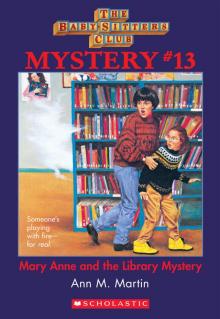 Mary Anne and the Library Mystery
Mary Anne and the Library Mystery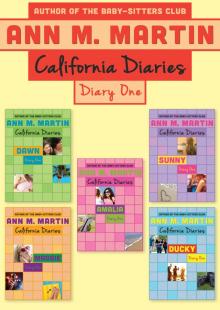 Diary One: Dawn, Sunny, Maggie, Amalia, and Ducky
Diary One: Dawn, Sunny, Maggie, Amalia, and Ducky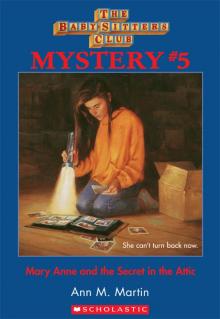 Mary Anne and the Secret in the Attic
Mary Anne and the Secret in the Attic Kristy and the Mother's Day Surprise
Kristy and the Mother's Day Surprise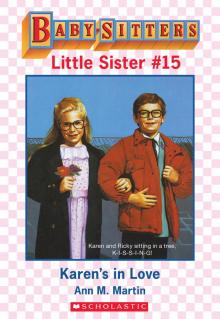 Karen's in Love
Karen's in Love Welcome to the BSC, Abby
Welcome to the BSC, Abby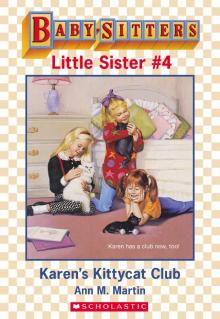 Karen's Kittycat Club
Karen's Kittycat Club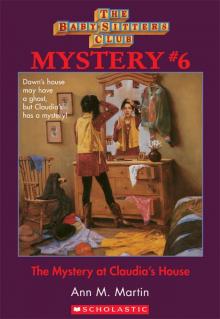 The Mystery at Claudia's House
The Mystery at Claudia's House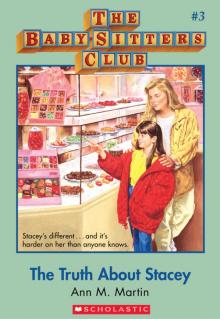 The Truth About Stacey
The Truth About Stacey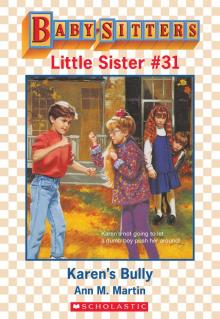 Karen's Bully
Karen's Bully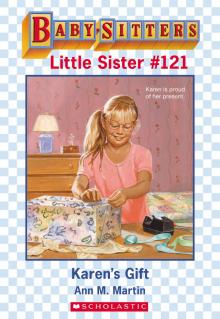 Karen's Gift
Karen's Gift BSC in the USA
BSC in the USA Everything for a Dog
Everything for a Dog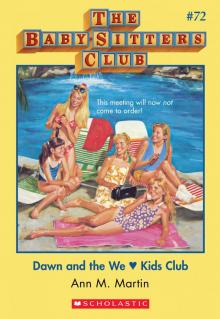 Dawn and the We Love Kids Club
Dawn and the We Love Kids Club Karen's Ghost
Karen's Ghost Stacey's Lie
Stacey's Lie Jessi's Secret Language
Jessi's Secret Language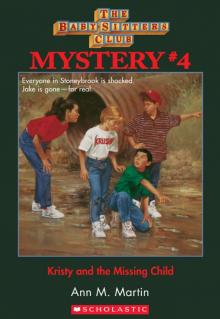 Kristy and the Missing Child
Kristy and the Missing Child Better to Wish
Better to Wish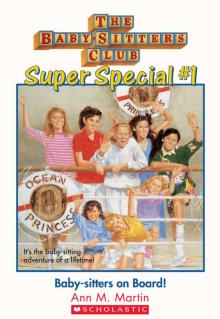 Baby-Sitters on Board!
Baby-Sitters on Board!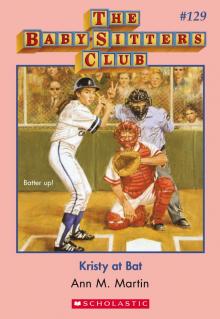 Kristy at Bat
Kristy at Bat Everything Changes
Everything Changes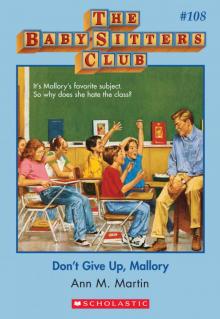 Don't Give Up, Mallory
Don't Give Up, Mallory A Dog's Life: The Autobiography of a Stray
A Dog's Life: The Autobiography of a Stray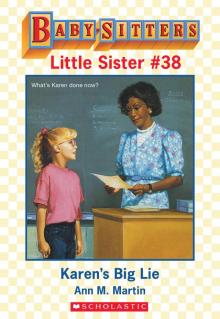 Karen's Big Lie
Karen's Big Lie Karen's Show and Share
Karen's Show and Share Mallory Hates Boys (and Gym)
Mallory Hates Boys (and Gym)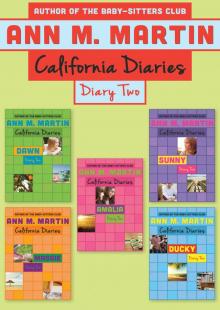 Diary Two: Dawn, Sunny, Maggie, Amalia, and Ducky
Diary Two: Dawn, Sunny, Maggie, Amalia, and Ducky Karen's Pen Pal
Karen's Pen Pal Claudia and the Friendship Feud
Claudia and the Friendship Feud Karen's Secret Valentine
Karen's Secret Valentine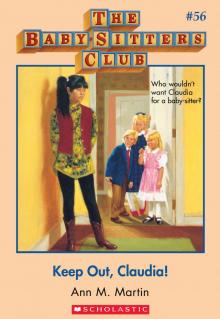 Keep Out, Claudia!
Keep Out, Claudia! Aloha, Baby-Sitters!
Aloha, Baby-Sitters!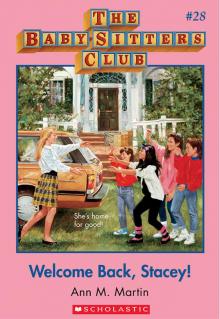 Welcome Back, Stacey
Welcome Back, Stacey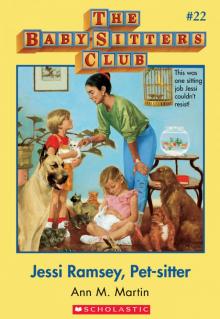 Jessi Ramsey, Pet-Sitter
Jessi Ramsey, Pet-Sitter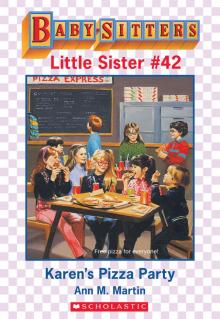 Karen's Pizza Party
Karen's Pizza Party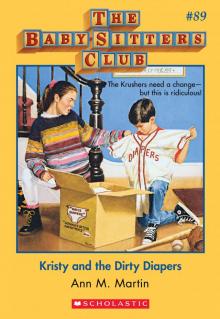 Kristy and the Dirty Diapers
Kristy and the Dirty Diapers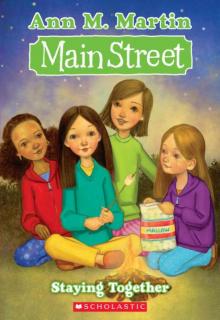 Staying Together
Staying Together Dawn and the Surfer Ghost
Dawn and the Surfer Ghost Claudia Makes Up Her Mind
Claudia Makes Up Her Mind Jessi's Gold Medal
Jessi's Gold Medal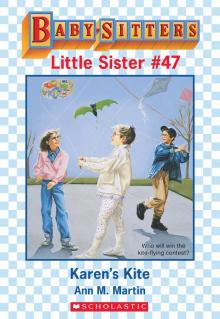 Karen's Kite
Karen's Kite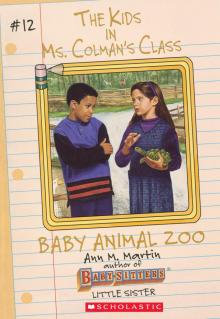 Baby Animal Zoo
Baby Animal Zoo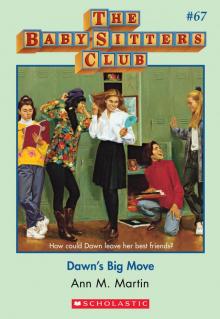 Dawn's Big Move
Dawn's Big Move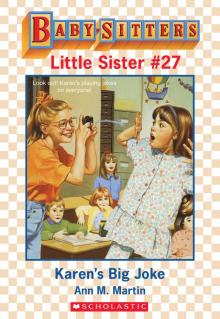 Karen's Big Joke
Karen's Big Joke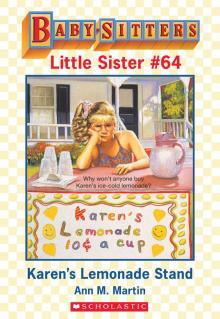 Karen's Lemonade Stand
Karen's Lemonade Stand Ma and Pa Dracula
Ma and Pa Dracula Baby-Sitters' Haunted House
Baby-Sitters' Haunted House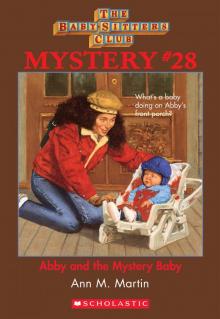 Abby and the Mystery Baby
Abby and the Mystery Baby Home Is the Place
Home Is the Place Karen's Grandad
Karen's Grandad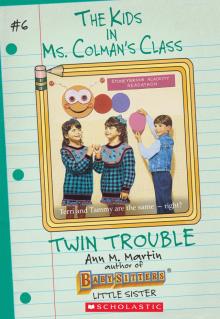 Twin Trouble
Twin Trouble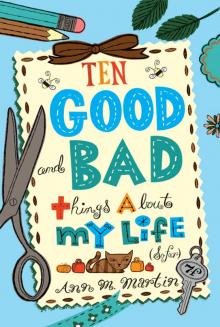 Ten Good and Bad Things About My Life (So Far)
Ten Good and Bad Things About My Life (So Far)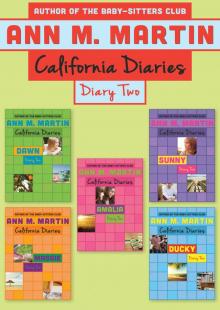 Diary Two
Diary Two Baby-Sitters Club 027
Baby-Sitters Club 027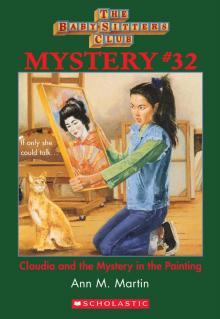 Claudia and the Mystery Painting
Claudia and the Mystery Painting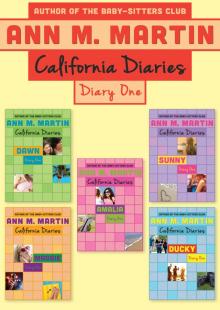 Diary One
Diary One Baby-Sitters Club 037
Baby-Sitters Club 037 Baby-Sitters Club 028
Baby-Sitters Club 028 Baby-Sitters Club 085
Baby-Sitters Club 085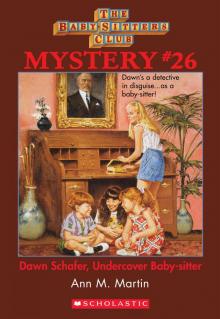 Dawn Schaffer Undercover Baby-Sitter
Dawn Schaffer Undercover Baby-Sitter Jessi's Babysitter
Jessi's Babysitter The Baby-Sitters Club #110: Abby the Bad Sport (Baby-Sitters Club, The)
The Baby-Sitters Club #110: Abby the Bad Sport (Baby-Sitters Club, The) Karen's Little Sister
Karen's Little Sister Baby-Sitters Club 058
Baby-Sitters Club 058 Claudia And The Genius On Elm St.
Claudia And The Genius On Elm St. Missy Piggle-Wiggle and the Sticky-Fingers Cure
Missy Piggle-Wiggle and the Sticky-Fingers Cure Kristy and Kidnapper
Kristy and Kidnapper Baby-Sitters Club 041
Baby-Sitters Club 041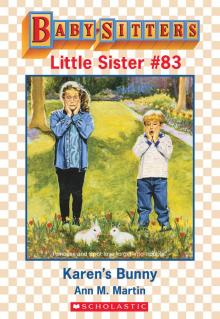 Karen's Bunny Trouble
Karen's Bunny Trouble Baby-Sitters Club 032
Baby-Sitters Club 032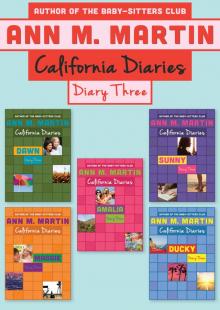 Diary Three
Diary Three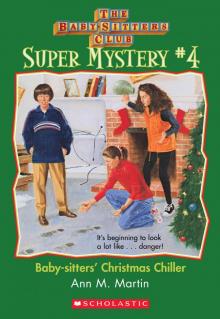 Christmas Chiller
Christmas Chiller Karen's Half-Birthday
Karen's Half-Birthday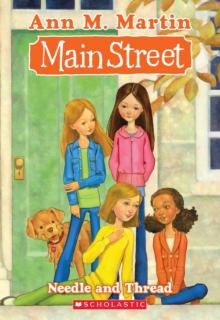 Needle and Thread
Needle and Thread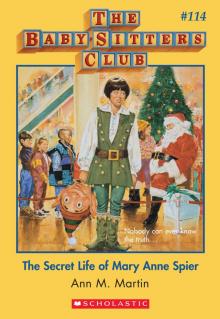 Secret Life of Mary Anne Spier
Secret Life of Mary Anne Spier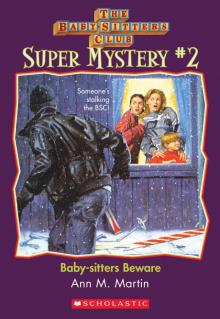 Baby-Sitters Beware
Baby-Sitters Beware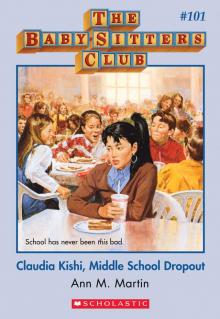 Claudia Kishi, Middle School Drop-Out
Claudia Kishi, Middle School Drop-Out Logan Likes Mary Anne !
Logan Likes Mary Anne ! Baby-Sitters Club 061
Baby-Sitters Club 061 Best Friends
Best Friends Baby-Sitters Club 031
Baby-Sitters Club 031 Karen's Little Witch
Karen's Little Witch Jessi Ramsey, Petsitter
Jessi Ramsey, Petsitter Baby-Sitters Club 123
Baby-Sitters Club 123 Baby-Sitters Club 059
Baby-Sitters Club 059 Baby-Sitters Club 033
Baby-Sitters Club 033 Baby-Sitters Club 060
Baby-Sitters Club 060 Baby-Sitters Club 094
Baby-Sitters Club 094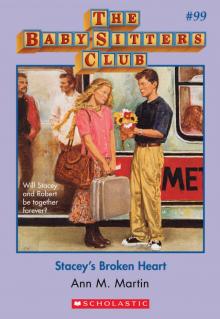 The Baby-Sitters Club #99: Stacey's Broken Heart
The Baby-Sitters Club #99: Stacey's Broken Heart The Baby-Sitters Club #109: Mary Anne to the Rescue (Baby-Sitters Club, The)
The Baby-Sitters Club #109: Mary Anne to the Rescue (Baby-Sitters Club, The) Mystery At Claudia's House
Mystery At Claudia's House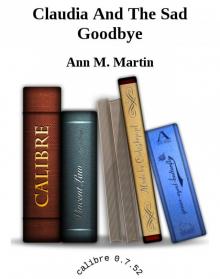 Claudia And The Sad Goodbye
Claudia And The Sad Goodbye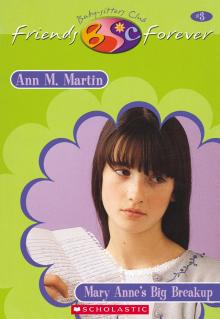 Mary Anne's Big Break-Up
Mary Anne's Big Break-Up Baby-Sitters Club 025
Baby-Sitters Club 025 Baby-Sitters Club 042
Baby-Sitters Club 042 Stacey and the Mystery of the Empty House
Stacey and the Mystery of the Empty House Karen's Baby-Sitter
Karen's Baby-Sitter Claudia's Friendship Feud
Claudia's Friendship Feud Baby-Sitters Club 090
Baby-Sitters Club 090 Baby-Sitters Club 021
Baby-Sitters Club 021 Baby-Sitters Club 056
Baby-Sitters Club 056 Baby-Sitters Club 040
Baby-Sitters Club 040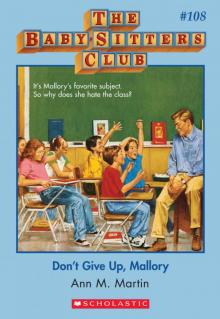 The Baby-Sitters Club #108: Don't Give Up, Mallory (Baby-Sitters Club, The)
The Baby-Sitters Club #108: Don't Give Up, Mallory (Baby-Sitters Club, The)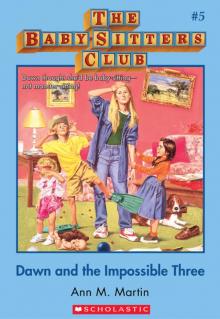 Dawn and the Impossible Three
Dawn and the Impossible Three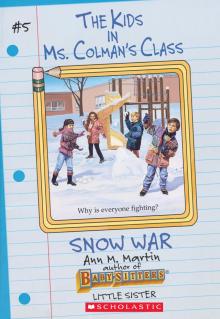 The Snow War
The Snow War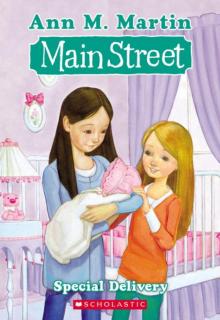 Special Delivery
Special Delivery Baby-Sitters Club 057
Baby-Sitters Club 057 Mary Anne And Too Many Babies
Mary Anne And Too Many Babies Baby-Sitters Club 030
Baby-Sitters Club 030